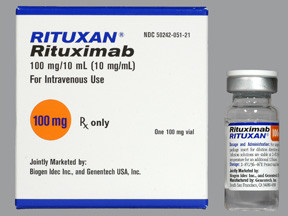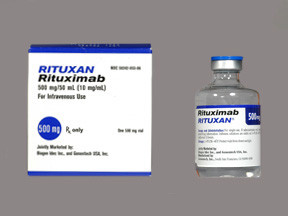RITUXIMAB - INJECTION
PHONETIC PRONUNCIATION: (ri-TUX-i-mab)
COMMON BRAND NAME(S): Rituxan
GENERIC NAME(S): rituximab
Uses
USES: Rituximab is used to treat certain types of cancer (such as non-Hodgkin's lymphoma, chronic lymphocytic leukemia). It works by slowing or stopping the growth of cancer cells. Rituximab is used to treat rheumatoid arthritis and can decrease joint pain and swelling. It is also used to treat certain types of blood vessel disease (such as Wegener's granulomatosis, microscopic polyangiitis) and can decrease the swelling of the blood vessels.
How to use RITUXIMAB - INJECTION
HOW TO USE: Read the Medication Guide provided by your pharmacist before you start using rituximab and each time you get a refill. If you have any questions, ask your doctor or pharmacist. Your doctor should prescribe other medications (such as acetaminophen, an antihistamine, methylprednisolone) for you to take before each treatment to help reduce side effects, such as fever and chills. Carefully follow your doctor's instructions. This medication is given by slow injection into a vein by a health care professional as directed by your doctor. The dosage and treatment schedule are based on your medical condition, body size, and response to treatment.
Side Effects
Precautions
Interactions
Overdose
Images
Reviews
Faq for RITUXIMAB - INJECTION
Rituximab is a medication that belongs to a group of drugs called monoclonal antibodies. It is used to treat certain types of cancer like non-Hodgkin's lymphoma, chronic lymphocytic leukemia, and certain autoimmune diseases like rheumatoid arthritis, granulomatosis with polyangiitis, and microscopic polyangiitis.
Rituximab works by targeting and binding to a protein called CD20 found on the surface of certain immune cells called B lymphocytes. By binding to CD20, rituximab helps to destroy these cells, leading to a reduction in tumor growth and immune system activity.
Rituximab is typically administered as an intravenous (IV) infusion by a healthcare professional in a hospital or clinic setting. The dosage and infusion rate will vary depending on the specific condition being treated.
Common side effects of rituximab may include infusion reactions (fever, chills, rash, nausea), infections, fatigue, cough, headache, muscle pain, and low white blood cell count. It is important to report any side effects to your healthcare provider.
Yes, rituximab can cause serious side effects, including severe infusion reactions, progressive multifocal leukoencephalopathy (a rare brain infection), severe infections, heart problems, lung problems, and skin reactions. It is important to seek medical attention immediately if you experience any concerning symptoms.
Rituximab has the potential to harm an unborn baby and may also pass into breast milk, so it is generally not recommended for use during pregnancy or breastfeeding. Discuss with your healthcare provider if you have concerns or are planning a pregnancy.
The response to rituximab treatment varies depending on the specific condition being treated. In some cases, improvement may be seen within a few weeks, while in other cases it may take several months. Your healthcare provider will monitor your progress and adjust the treatment plan accordingly.
Rituximab may interact with certain medications, including live vaccines and other immunosuppressant drugs. Inform your healthcare provider about all the medications you are taking, including over-the-counter drugs and herbal supplements, to avoid potential interactions.
The frequency and duration of rituximab treatment can vary depending on the condition being treated and the individual patient. Some conditions may require multiple treatment cycles, while others may require ongoing maintenance therapy. Your healthcare provider will determine the appropriate treatment plan for you.
Warning
WARNING: Rituximab may rarely cause serious (sometimes fatal) side effects including severe breathing problems or heart problems (such as heart attack, irregular heartbeat). If these serious side effects occur, they usually happen during the first treatment with rituximab. Your doctor will carefully watch you during treatment and may stop or slow down your treatment if you have any signs of a reaction. Get medical help right away if you have trouble breathing, itching, swelling (especially of the throat/lips), dizziness, fast/slow/irregular heartbeat, or chest pain. Rarely, people using this medication have had serious (sometimes fatal) skin reactions (such as Stevens-Johnson syndrome). Get medical help right away if you develop any rash, blisters, peeling skin, or sores on your skin, lips, or in your mouth. This medication may increase your risk of getting a rare but very serious (possibly fatal) brain infection (progressive multifocal leukoencephalopathy-PML). Get medical help right away if you have any of these side effects: clumsiness, loss of coordination/balance, weakness, sudden change in your thinking (such as confusion, difficulty concentrating, memory loss), difficulty talking/walking, seizure, vision changes. Rituximab may cause serious (possibly fatal) liver disease in people who have a current or past infection with hepatitis B. This may occur during treatment or up to 2 years after treatment is finished. Before starting this medication, tell your doctor if you have ever had hepatitis B. Your doctor should order a test to see if you have the hepatitis B infection before starting treatment. Tell your doctor right away if you have symptoms of liver disease, such as nausea/vomiting that doesn't stop, loss of appetite, stomach/abdominal pain, yellowing eyes/skin, or dark urine.
Disclaimer
IMPORTANT: HOW TO USE THIS INFORMATION: This is a summary and does NOT have all possible information about this product. This information does not assure that this product is safe, effective, or appropriate for you. This information is not individual medical advice and does not substitute for the advice of your health care professional. Always ask your health care professional for complete information about this product and your specific health needs.


No Reviews Yet